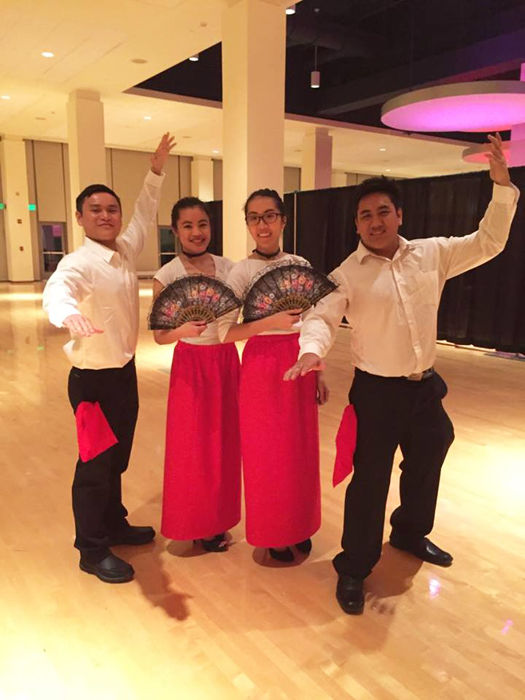Filipino American cultural dance night
From left to right: Philip Zaragoza, Karina Concepcion, Demi Muyuela and Denzel Bartolaba at a previous Filipino American Student Association event.
March 4, 2016
Prepare to be swayed by the rhythms and moves of dance group Buhay at Filipino Culture Night.
The Filipino American Student Association’s (FASA) annual event Filipino Culture Night (FCN) is an annual fundraiser and showcase of talent and culture between members of the organization and the Asian Pacific American (APA) community.
This year the group wanted to emphasize the Filipino identity by focusing on Buhay (the Filipino word for life), said FASA co-vice president and senior Demi Muyuela. There will be other performers and musicians, but Muyuela said the group wanted to keep the focus on reviving Buhay.
“I want people to have a good time. We’ve worked hard for this night and I want people to be surprised by the choreography. Our choreographers did a wonderful job and spent countless hours coming up with our routines. I had a lot of fun learning them,” FASA Treasurer and junior Patrick Donovan said.
Dancers have been rehearsing a mix of all-female, coed and all-male dances. Muyuela said that all of the dances have an important purpose to them.
“Performances are much more exciting than a lecture or a meeting,” Muyuela said. “FCN is a more interactive way for our members to learn about the Philippines. It is also a big part of Filipino culture. We are big on hospitality, smiling and being open, so performances are a great compliment to our personality.”
Dugso is a tribal thanksgiving dance to celebrate a milestone such as the birth of a tribal chieftain son or a victory in war. The dance utilizes bells on the ankles and large feathery headdresses, Muyuela said.
Maglangka is an all-female Muslim dance used to teach and train young ladies the ways of good breeding and accomplished dance skills.
Carinosa is a dance of Hispanic origin, where the fan or handkerchief plays an instrumental role as it places the couple in a romantic scenario.
Tinikling is a traditional dance involving one pair moving between bamboo poles on the ground in coordination, simulating the movements of the Tinikling bird.
To take these dances to another level, the dancers will perform in different costumes to go along with each dance, Muyuela said.
“Dressing in costumes sets us apart from other Filipino student organizations because not all of them dress up for their FCN,” Donovan said.
People should be aware of diversity around them, but it’s not all socio-political issues, it can also be fun, Muyuela said.
“It is a way to put ourselves out there. This is a way for our members to put something together on our own,” said public relations chair and senior Vivian Dang. “It is a lot of hard work and time, but it’s really satisfying when it is over.”
The club members all shared similar sentiments when it came to what they wanted to illustrate to the WSU community.
“I want people to be aware of the diversity around them. It is important to make people aware of minorities’ challenges and cultural clubs, but it’s not all socio-political issues. Culture is fun,” Muyuela said.
A lot of time is going into hand-making the costumes and we’re all excited to see how they turn out, Donovan said.
“Learn where we come from and enjoy another culture and experience besides just one. We are more than our stereotypical food,” Donovan said.
Filipino Culture Night will take place at Kimbrough 101 on Friday from 7 – 8 p.m. Doors open at 6:30 p.m. Tickets are available for pre-sale this week at the Asian American Pacific Islander Center in the CUB Room 414 from 12 – 2 p.m. Tickets are $5 for members and $8 for non-members. Tickets can also be purchased at the door for the same price.










